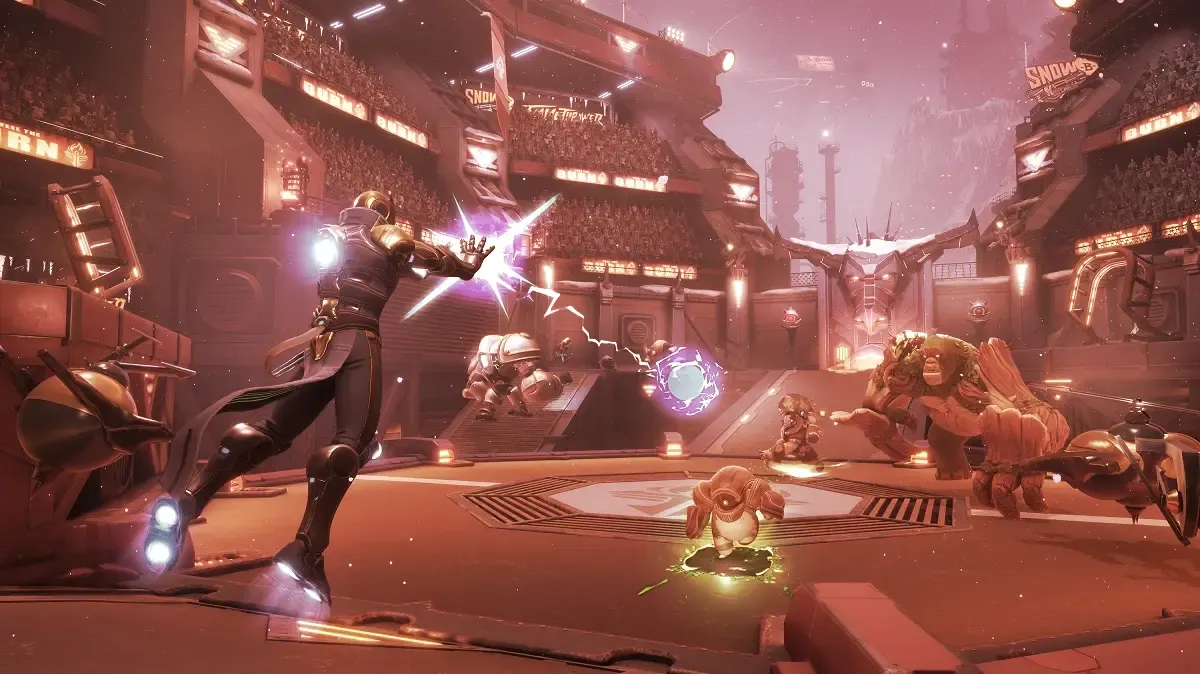Veteran video game creator Paul Bettner, who co-created mobile gaming smash Words With Friends and helped develop the classic Age of Empires franchise, has been working on his Web3 game Wildcard for over five years. Now he’s finally ready to share it with the world.
The first public playtest of Wildcard is set to launch February 23 in an event called “Melee on the Meteor.” The game, which Bettner says was designed with spectators in mind, is a competitive multiplayer online battle arena (MOBA) game akin to smashes like League of Legends and Dota 2.
Wildcard serves up player-versus-player (PvP) gameplay, virtual NFT cards, real-time strategy (RTS) elements, and Web3 integration via Ethereum scaling network Polygon. “Melee on the Meteor” will take place in a virtual venue called Frostburn Arena, and viewers can watch from within the in-game 3D arena as two characters duke it out on a grand scale—and even collect NFT rewards in the process.
“We really want an experience where the competitor can literally share rewards with their fans live during the stream, and Web3 is the technology that lets us do that,” Bettner told Decrypt.
The first public Wildcard exhibition will pit two community testers against each other, pulled from its Discord server of over 30,000 verified members. The second match will be a battle between two Web3 content creators, Brycent and Cryptostache, while the third round will be a finale featuring the winners of the previous two rounds.
During the matches, viewers will be able to watch via the game's Discord server and potentially win POAP-style NFT collectible airdrops called “Wildcard Swag,” or allowlist access to mint the game’s first fully-fledged NFT card collection, which does not yet have a public release date.
Under his Playful Studios banner, Bettner raised $46 million in 2022 in a round led by Paradigm, with Griffin Gaming Partners and VC fund manager Sabrina Hahn also participating. Now, after extensive community engagement and development, Wildcard is ready for its first moments in the spotlight.
The Melee on the meteor is coming.
It’s Wildcard’s first exhibition, and if you’re not there? Well, Sister, you’re going to miss it.
Here’s my personal recommendation… DON’T!
2.23.23#Wildcard #MOBA #Web3 pic.twitter.com/jl9lpJAYQ2
— WILDCARD (@PlayWildcard) February 10, 2023
The game’s whitepaper, dubbed the “Wildpaper Lite,” details Bettner and team’s ambitious vision for the upcoming game. Bettner believes that esports is massively important to gaming, and that gamers watch others play video games nearly as much as they play games themselves.
Inspired by these sometimes-massive livestreaming and esports communities, Bettner and his wife Katy Bettner set out to create a game in which fans can participate in a more meaningful (and interactive) way.
The NFT Balancing Act
Bettner himself has gone from being a crypto skeptic to a Web3 advocate—but that doesn’t mean anything and everything in Wildcard will be an NFT.
“We’re allergic to pay-to-win, as a developer,” Bettner told Decrypt in an interview, referring to his stance on allowing players to simply buy NFTs that give them an easy path to the top of a game’s leaderboards.
That said, Wildcard will be offering virtual cards as NFTs, which is an essential part of the game. But Bettner insists that no single card could grant a player a win on the battlefield.
“Our game is about collecting, and you use your collection to play," Bettner said. "That’s what provides for us the ability to have a game that both has valuable, collectible cards but it isn’t pay-to-win."
“There’s not a card in Magic: The Gathering, really, that is pay-to-win. Those cards change, the meta evolves, and they have to always be walking this fine line of creating rareness and cards that are desirable but not creating a pay-to-win economy,” he added, citing Pokémon and Blizzard’s Hearthstone as other examples of competitive card games he believes are not giving the richest players easy wins.
Livestreaming’s Limits
Bettner explained that Wildcard was developed to create a more direct connection between players and viewers, with direct NFT airdrops for watching players and engaging with their content. He’s well aware of how important livestreaming platforms like Twitch are to both gamers and game developers, but wants to solve some of the problems that Twitch can’t (or won’t) address.
Bettner told Decrypt that his conversations with Twitch, its parent company Amazon, and the Google-owned YouTube didn’t pan out the way he had initially hoped.
“It was a little difficult, because those platforms have a specific way that they think about their audience,” Bettner said. “They think about monetizing their audience.”
Bettner said that the Wildcard team became “frustrated” with Twitch and YouTube’s “limited” scope and ability to offer game spectators a more immersive and rewarding experience.
“A platform like Twitch, their capacity to deliver that is kind of limited," Bettner said. "The real magic can happen in a video game where that moment can come to life where that fan can see themselves."
Why Web3?
Bettner said he sometimes sees Web3 as a “solution in search of a problem,” meaning that some crypto enthusiasts might be looking to add crypto wherever possible for purely philosophical or financial reasons without a substantial motive.
But in the case of Wildcard, he believes that Web3 was necessarily the solution to the game’s biggest problem.
In the future, Wildcard will let viewers see themselves in the arena's audience as an avatar with a specific seat. From their seat, viewers will be able to snag NFT airdrops that are launched into the crowd.
“When that streamer is connected with their wallet and their fans are coming in with their wallets," Bettner explained, "it's literally an airdrop to do that magical moment of throwing the ball up into the stands, firing a T-shirt cannon, and having your fans be able to wear on their PFP like your brand or whatever.”
“Those are the kinds of moments that we're able to build,” he concluded.

